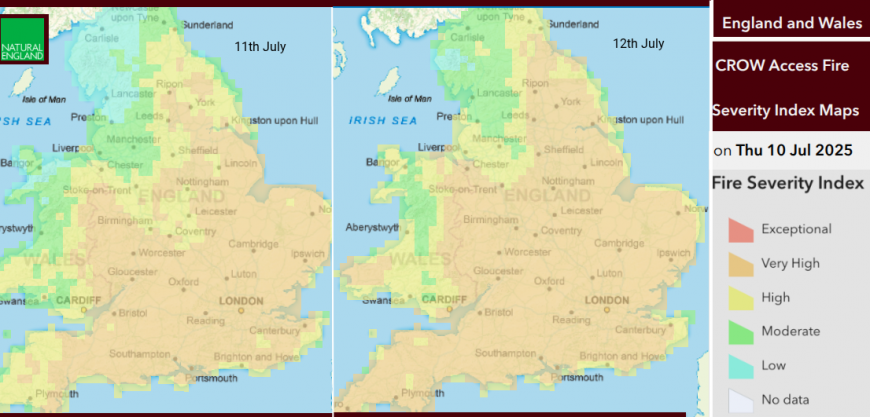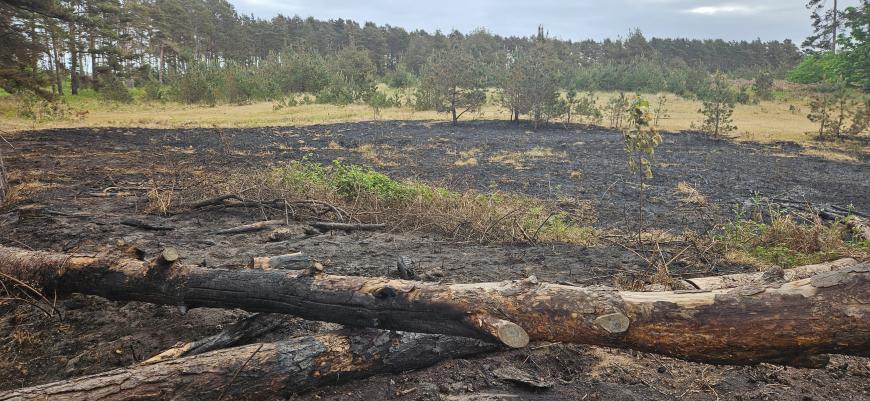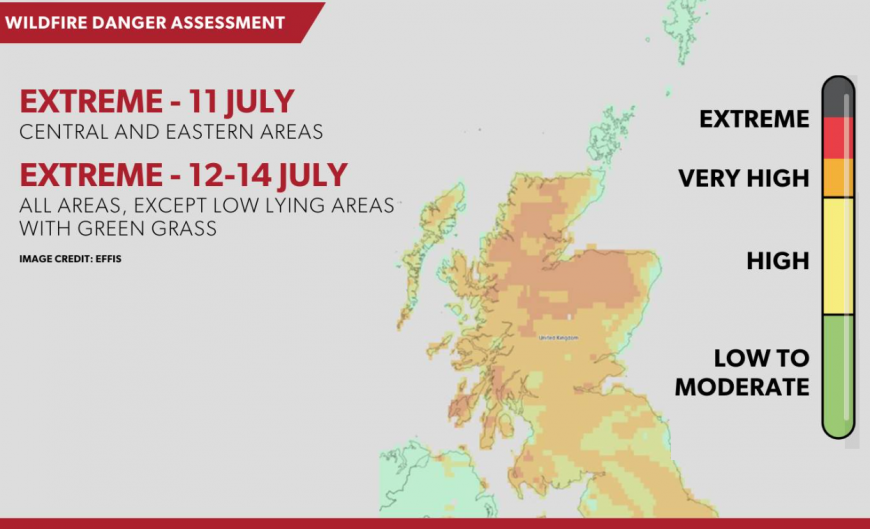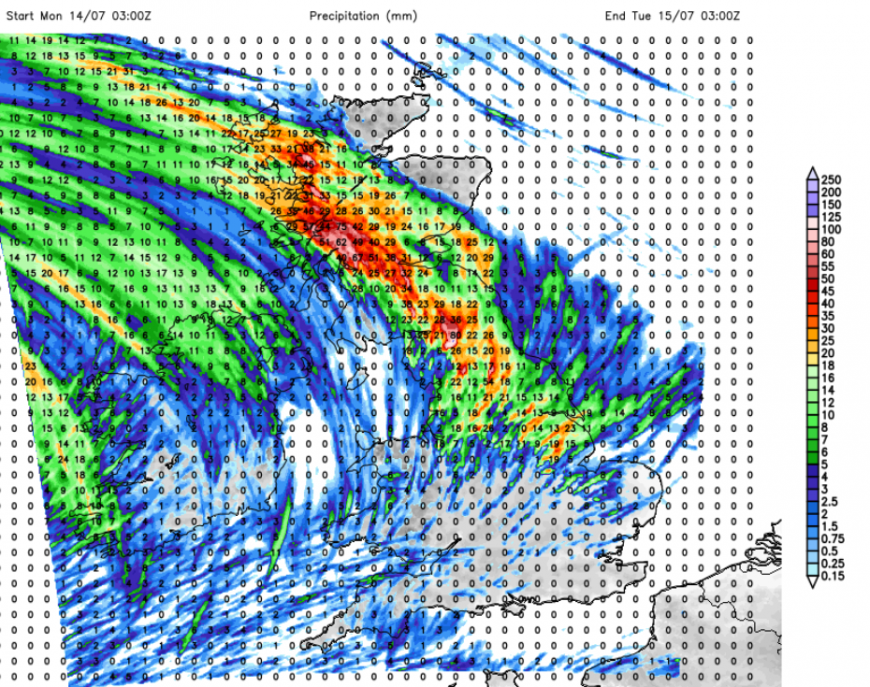
Fire chiefs are urging people to take care and act responsibly this weekend as the heat and sunshine mean that more people will go outdoors. Wildfire and water incidents are likely to increase.
Up and down the country, Fire & Rescue Teams are preparing and planning for the surge in demand as heatwave conditions set in. On top of the usual emergencies, the increased risk of wildfires could prompt a huge drain on resources. There can also be more water safety incidents in hot and sunny weather, again with more 999 calls.
In London, fire crews have been practising and becoming familiar with new equipment such as ‘The Unimog’, which has a capacity of 4,500 litres of water and 162 litres of foam with off-road capability. These machines can access hard-to-reach heathlands and create fire breaks with their wall of water.
The London Fire Brigade said that there had already been 16 grass fires needing four or more fire engines to attend in 2025, following one of the driest UK springs on record. By the same time last year, there had been just two. Overall, there have been 20 wildfires in London this year (10th July).

The Met Office's Fire Severity Index (FSI), is an assessment of how severe a fire could become if one were to start. The FSI uses information such as wind speed, temperature, time of year and rainfall. It is not an assessment of the risk of wildfires occurring.
Heat and dry conditions mean fires spread rapidly across grassland, moorland and woodland. Parts of England are entering their third heatwave this summer and this weekend will be hot, dry and sunny more widely across the UK, with more areas reaching the heatwave criteria. In fine weather, more people head outside into the countryside or to the coast, lakes or lochs. Fire teams are urging everyone to enjoy the outdoors safely and responsibly.
It is this strain on services that are already carrying out emergency responses. Accidents will always happen, but the plea here is for people to take care around water in the hot weather and also not to cause a wildfire.

In the UK, most wildfires are the result of human activity, such as:
- Littering (from improper disposal of a cigarette to dropping litter such as reflective items and glass bottles that then start a fire)
- Unattended fires (campfires, bonfires and barbecues left unattended or not fully extinguished)
- Deliberate fire-setting
- Controlled burning used to manage land that then gets out of control
The Mid & West Wales FRS are part of the Wales Wildfire Board. They want to better understand the fire risks in Wales and impress on people how quickly a fire can spread, “destroying everything in its path. The damage to the surrounding landscape and the effect on historic features, habitats and wildlife largely goes unrecognised.”
As our climate heats, wildfires are becoming more of a problem, often impacting urban residential areas or tourist destinations. These are not just distant events but lead to many impacts locally:
- Biodiversity changes, also Carbon emissions and climate change
- Soil and water: Wildfire removes surface vegetation and alters soil properties. Erosion will exacerbate flooding and reduce water quality.
- Human health: Wildfires present hazards which may injure or kill emergency responders and members of the public. Exposure to wildfire smoke can cause health impacts over great distances and trauma can impact people’s mental health .
- Economic: Wildfires cause capital losses, disruption to economic activity and health effects.
Reducing the human element is vital. If the wind suddenly gets up or changes direction, embers can be spread, and dry vegetation will soon catch fire. Vaping may have cut down the number of cigarette smokers but discarding a cigarette in the countryside is often the start of a fire by a footpath. Disposable barbeques are a nightmare in these times of dry weather and high fire risk.
- Don’t have BBQs, on any flammable surface during very dry and prolonged weather. Instead, have them within safe designated BBQ areas.
- Don’t have campfires or any outdoor fires when a wildfire danger assessment is in place or during prolonged dry periods.
- Always fully extinguish cigarettes and dispose of them responsibly.

Scotland
At the end of June, it was the Highlands of Scotland and Moray that were on fire with wildfires damaging “7,500 hectares of land, equivalent to 10,500 football pitches” STV. Fire crews from Aberdeenshire, Moray and the Highlands battled against the flames in rough, often inaccessible terrain, and at times with no helicopter support available.
On Wednesday, the 9th July, the Scottish Fire and Rescue Service was alerted to the blaze in the same area. Four appliances, a water carrier and a welfare unit were dispatched to the scene and a road was closed overnight.
The Scottish Environmental Protection Agency is continuing to monitor the water scarcity situation for eastern Scotland, another issue as the hot, sunny weather continues without much rain. Gathering water supplies to fight fires in rural settings can be difficult.

Yorkshire Water's water restrictions start today, 11th July with hosepipe bans for their region as part of their Temporary Use Ban (TUB). The dry spring not only created dry vegetation, which is perfect fuel for wildfires, but Yorkshire is officially in drought. Normally, groundwater sources and reservoirs are topped up in spring but there have been dry seasons recently, although with great variation across the UK.
The UK government defines the term ’wildfire’ to mean an “uncontrolled fire that burns vegetation, such as grass, heather, woodland, crops and scrubland”.
The National Fire Chiefs Council (NFCC) maintains that not all outdoor fires are wildfires. Instead, it defines a wildfire as “any uncontrolled vegetation fire which requires a decision, or action, regarding suppression”. In addition, the NFCC specifies that a wildfire needs to meet criteria of at least one hectare in area, requires a committed resource of at least four FRS appliances/resources, for at least six hours, and presents a serious threat to life, environment, property and infrastructure.
The Northern Ireland Fire & Rescue advice includes:
- Be considerate in parking vehicles so you don’t impede access for emergency vehicles.
- Keep children away from lighters, matches and open fires.
- Don’t attempt to tackle fires that can’t be extinguished with a bucket of water – leave the area as quickly as possible.
Much of the advice is covered by the Countryside Code, but that is not always something that people have come across or think about as they set off on a day out in the height of summer.
“Don’t leave litter, take it home with you and leave no trace. Glass in direct sunlight can cause a fire. Ensure none is lying around. ”
In Scotland this month, it was rural and remote communities that were affected by the wildfires, with significant damage and worry as they burned for days. There are impacts on the land and for wildlife too. "Livestock, farmland, wildlife, protected woodland, and sites of special scientific interest can all be devastated by these fires, as can the lives of people living and working in rural communities.” SFRS
There is also the negative impact on the environment as plumes of smoke are released into the atmosphere. It is not just remote Highland areas; the threat often creeps nearer to communities that border the countryside. Sometimes, after days of observing the fires on nearby hills or moorlands.
NFCC Chair Phil Garrigan said: “We are deeply concerned about the escalating threat of wildfires this summer, which have the potential to become more frequent, intense, and dangerous… wildfires are no longer rare or isolated incidents — they are a growing national risk that require a national-level response.”
“We want everyone to enjoy the nice weather, we are just asking that they take extra care when out and about because it only takes one small error to lead to a significant wildfire.”
What to do if you discover a wildfire or see suspicious behaviour
To help firefighters respond quickly and effectively report a wildfire-
- Safety first: Position yourself away from the fire, smoke, and any vegetation. If you are in your car, close all windows and vents.
- Call 999 immediately: Request the Fire Service.
- Stay calm, be detailed: Clearly state your location (road names, landmarks, or use a locator app like What3Words). Describe the fire's size and direction of spread.
- Do not fight the fire: Wildfires are unpredictable and dangerous. Leave the firefighting to us, it’s what we are trained to do.
- Stay far away from the wildfire: The fire can smoulder or spread underground.

There is no significant rainfall forecast this week or over the weekend. Things should change early next week as an Atlantic front moves in from the west but this still leaves southern Britain mostly dry. Heavy rain is forecast further north early next week.
Loading recent activity...